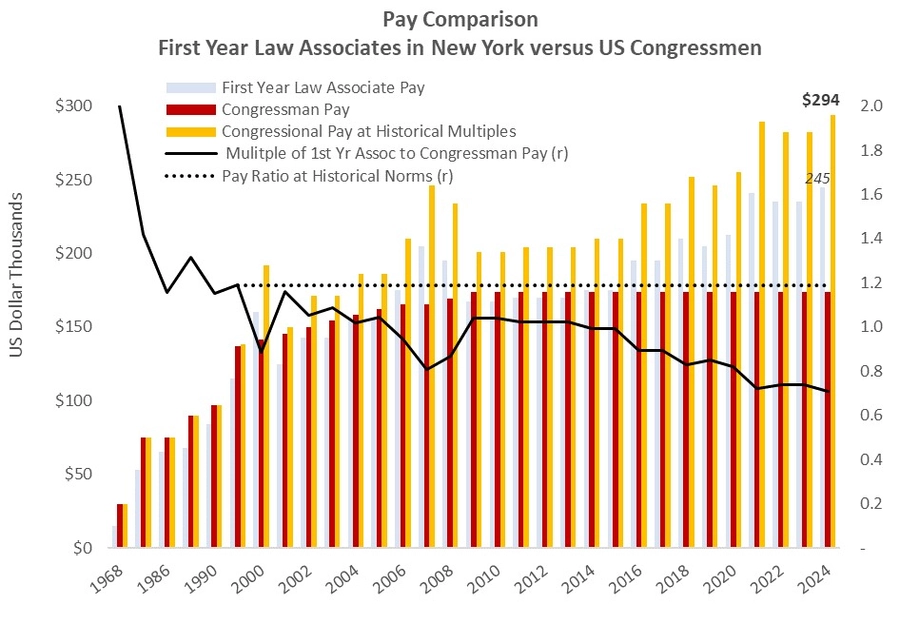Sen. Elizabeth Warren (D, MA) has called for an increase in Congressional salaries. But what's the right number, and even more importantly, the right structure?
This may seem a bit arcane to my Ukrainian readers, but I am followed by many who work in Congress, and they will be interested on a personal level. I would add that pay structure is the key tool in 'draining the swamp', addressing corruption in Ukraine, and capturing Russia's governance in the post-conflict world.
JOIN US ON TELEGRAM
Follow our coverage of the war on the @Kyivpost_official.
Many forms of analysis commonplace in the corporate world are virtually unknown in the US government and DC think tank circles, and this includes the use of comparables.
In the private sector, when we try to establish the price of a good lacking a market -- Congressional salaries, for example -- we try to find a proxy. And, in fact, we have one: the starting salaries of first year associates in New York.
Why this? Most legislators are lawyers by trade, and we -- or at least I -- would hope that the public would prefer the best and the brightest to become members of Congress. First year law associates in New York are the best and brightest of their year, typically from Ivy League universities, and their salaries are tied to the market for premium legal services in the US. Therefore, if we believe we would like to recruit top-line legal professionals to serve in Congress, then first year associate salaries are a plausible comparable.

North Korea Slams US Criticism Over Troops in Ukraine, Calls It ‘Reckless Provocation’
Helpfully, such salaries have been published for more than fifty years.
As the graph above shows, Congressional pay in the 1960s was twice the compensation of first year legal associates in New York. By the mid-80s, however, legal salaries were catching up to Congressional pay, with Congressmen earning around 1.2x that of a first-year associate. After 2000, first year lawyers in Manhattan were earning as much as twenty-year Congressional veterans.
Since Congressional salaries were frozen in 2009, the comparison has yearly deteriorated such that today a 65-year-old Senator will earn only 71% of the pay of a first year New York lawyer with effectively no work experience.
In fact, the Majority and Minority leaders in the House and Senate earn $52,000 (21%) less, and the Speaker of the House earns $21,000 (9%) less, than a first-year lawyer in New York. This is frankly pathetic. I would argue that a Senator should make considerably more than a first-year lawyer, perhaps twice as much, but the political equilibrium seems to fall considerably lower. Even so, a Congressman should make at least 20% more than a first-year lawyer, about the same ratio as in the 1980s. If we apply that metric, Congressional salaries should be set at $294,000 for 2024, a 70% increase over the current pay level. Structure matters even more. The MAGA crowd wants to drain the swamp by changing personnel. But that's not how the professionals do it. If you want to change behavior, you change the way people are paid, specifically by tying pay to performance. I have consulted for both the private and public sectors, and the differences are stark. In the private sector, it's about delivering a product that customers value more than it costs to produce. Efficiency and effectiveness are essential.
By contrast, money is not currency in politics. Popularity and electability are. Cost/benefit analysis may motivate economists and the think tank world, but I have never seen it used in producing legislation. Instead, policy in the real world is about catering to the preconceptions of constituents, toeing the party line, and adherence to pre-cooked ideological positions.
Politicians often talk about fraud and waste, and some governments are indeed run by criminals and incompetents. (Corruption is the handmaiden of incompetence, in my experience.) In general, however, I have found national level bureaucrats and staffers in DC to be well-educated, well-meaning and competent. I consider many of them to be kindred spirits and friends.
The problem runs deeper. Monies are typically allocated in the political process with little to no regard for effectiveness or efficiency, and implementation is often painfully slow and bureaucratic. This may not matter when the government is small, but when the national budget is $6 trillion / year, as ours is, the difference between slightly better and slightly worse governance is easily $1 trillion / year. That's a lot of money. Tying pay to performance is a means to inject some discipline into the system, to motivate lawmakers to use taxpayer funds carefully. I will not belabor the mechanics of such a program here. Such a program would, however, have the effect of tempering political rhetoric in Congress and encouraging cross-aisle cooperation. It's one thing to bad mouth your opponents when it's costless. But when your bonus depends on using money wisely, well, people find a way to cooperate.
If you're a burn-it-to-the-ground MAGA Republican, the most revolutionary thing you could do is introduce a performance-based bonus. Democrats might have to go along with it. After all, they want a pay raise, too.
Steven Kopits heads Princeton Policy Advisors. A strategic management consultant and investment banker, he writes frequently on policy topics for a variety of publications, including Foreign Policy and The National Interest, and is a regular contributor to CNBC and The Hill.
This article is reprinted from Princeton Policy Blog. See the original here.
The views expressed in this opinion article are the author’s and not necessarily those of Kyiv Post.
You can also highlight the text and press Ctrl + Enter







